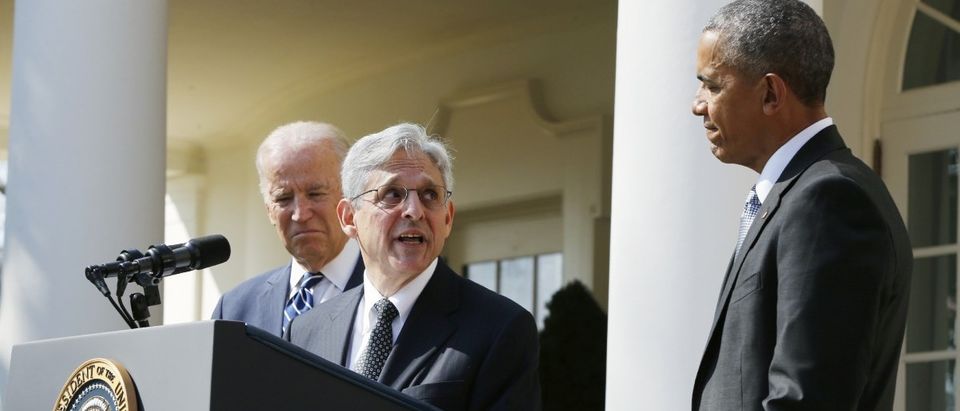In the waning days of the Obama administration, some liberal legal scholars have argued the president should recess appoint Judge Merrick Garland to the Supreme Court to punish Senate Republicans.
The Constitution’s recess appointment power allows the president to make appointments to federal offices without congressional consent while Congress is in recess. The appointment is only temporary, and expires at the conclusion of the ensuing Senate session.
Writing at the Washington Post’s Volokh Conspiracy, professor Jonathan Adler of Case Western University School of Law explains the appointment theory, which has gained traction in left-leaning liberal circles as almost certainly unconstitutional.
The scenario for appointing Garland before Obama leaves office runs as follows: When Congress returns to Washington on Jan. 3, the current congressional term will be gaveled out by the speaker of the house. Approximately one minute will elapse before he gavels in the 115th Congress. During this short period, called an “inter-session recess,” the president could appoint Garland to the Supreme Court.
This theory of the recess appointment power was used once before, by President Theodore Roosevelt in 1903, though it was repudiated by his contemporaries and never replicated by his successors.
It’s a novel, though not unprecedented theory, the sort of thing that would give some horn-rimmed parliamentarian his first ever sitting before tv-studio lights. But as Adler explains, it’s almost certainly bunk. (RELATED: Merrick Garland Is Going Back To His Old Job)
In NLRB v. Noel Canning, the Supreme Court was asked to resolve a recess appointment controversy relevant to this dispute. In the case, Noel Canning, a bottler and distributor for Pepsi-Cola, argued a National Labor Relations Board ruling concerning a labor dispute between its company and a union was invalid, because there were not enough members of the board to issue a ruling in the dispute.
The company argued two members of the board, ostensibly recess appointments made by President Barack Obama, were not lawful members of the NLRB because Congress was not technically in recess when Obama made the appointments. In other words, the company argued the president was abusing his recess appointment power. A unanimous court agreed.
Justice Stephen Breyer’s opinion for the court reads in part:
we conclude that the phrase “the recess” applies to both intra-session and inter-session recesses. If a Senate recess is so short [i.e., less than 3 days] that it does not require the consent of the House, it is too short to trigger the Recess Appointments Clause. See Art. I, § 5, cl. 4. And a recess lasting less than 10 days is presumptively too short as well.
Adler, explaining the ruling, says the Breyer opinion explicitly bans as unconstitutional the sort of recess-appointment scheme some have pushed the president to pursue for Judge Garland. He writes:
If a three-day recess is too short, a three-second recess would certainly be as well and, contrary to … Kilgore’s suggestion, Justice Breyer’s opinion makes no distinction between intrasession and intersession recesses. All told, every justice on the court embraced an opinion rejecting the idea that such an intersession recess appointment would be constitutional.
Garland, for his part, does not anticipate he will join the Supreme Court, and plans to resume hearing cases on the U.S. Court of Appeals for the District of Columbia Circuit in January.
Send tips to kevin@dailycallernewsfoundation.org.
All content created by the Daily Caller News Foundation, an independent and nonpartisan newswire service, is available without charge to any legitimate news publisher that can provide a large audience. All republished articles must include our logo, our reporter’s byline and their DCNF affiliation. For any questions about our guidelines or partnering with us, please contact licensing@dailycallernewsfoundation.org.


